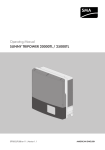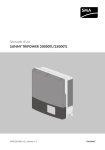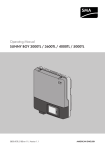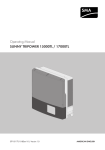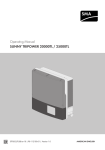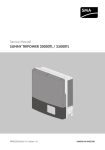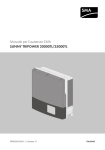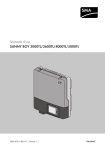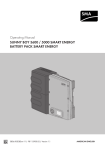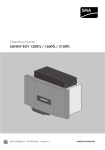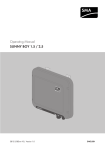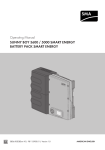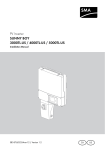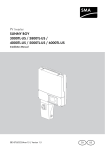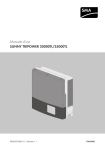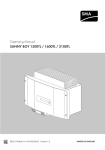Download Operating Manual - SUNNY TRIPOWER 20000TL / 25000TL
Transcript
Operating Manual SUNNY TRIPOWER 20000TL / 25000TL STP20-25TL-BE-en-12 | Version 1.2 ENGLISH Legal Provisions SMA Solar Technology AG Legal Provisions The information contained in these documents is property of SMA Solar Technology AG. Any publication, whether in whole or in part, requires prior written approval by SMA Solar Technology AG. Internal reproduction used solely for the purpose of product evaluation or other proper use is allowed and does not require prior approval. SMA Warranty You can download the current warranty conditions from the Internet at www.SMA-Solar.com. Trademarks All trademarks are recognized, even if not explicitly identified as such. A lack of identification does not mean that a product or symbol is not trademarked. The BLUETOOTH® word mark and logos are registered trademarks of Bluetooth SIG, Inc. and any use of these marks by SMA Solar Technology AG is under license. Modbus® is a registered trademark of Schneider Electric and is licensed by the Modbus Organization, Inc. QR Code is a registered trademark of DENSO WAVE INCORPORATED. Phillips® and Pozidriv® are registered trademarks of Phillips Screw Company. Torx® is a registered trademark of Acument Global Technologies, Inc. SMA Solar Technology AG Sonnenallee 1 34266 Niestetal Germany Tel. +49 561 9522-0 Fax +49 561 9522-100 www.SMA.de E-mail: [email protected] © 2004 to 2015 SMA Solar Technology AG. All rights reserved. 2 STP20-25TL-BE-en-12 Operating Manual SMA Solar Technology AG Table of Contents Table of Contents 1 2 Information on this Document ................................................. 5 1.1 1.2 1.3 1.4 1.5 Validity ................................................................................................ Target Group...................................................................................... Additional Information ....................................................................... Symbols .............................................................................................. Nomenclature..................................................................................... 5 5 5 6 7 Safety......................................................................................... 8 2.1 2.2 Intended Use ...................................................................................... 8 Safety Information.............................................................................. 8 3 Scope of Delivery...................................................................... 10 4 Product Description................................................................... 11 4.1 4.2 4.3 5 Mounting ................................................................................... 16 5.1 5.2 6 Sunny Tripower .................................................................................. 11 LED Signals ......................................................................................... 13 Interfaces and Functions .................................................................... 14 Requirements for Mounting ............................................................... 16 Mounting the Inverter......................................................................... 18 Electrical Connection................................................................. 22 6.1 6.2 Safety during Electrical Connection.................................................. 22 Overview of the Connection Area .................................................... 23 6.2.1 6.2.2 6.3 AC Connection................................................................................... 24 6.3.1 6.3.2 6.3.3 6.4 Requirements for the AC Connection............................................ 24 Connecting the Inverter to the Utility Grid.................................... 26 Connecting Additional Grounding ............................................... 28 DC Connection................................................................................... 28 6.4.1 6.4.2 7 View from Below ............................................................................ 23 Interior View ................................................................................... 24 Requirements for the DC Connection............................................ 28 Connecting the PV Array ............................................................... 29 Commissioning.......................................................................... 32 Operating Manual STP20-25TL-BE-en-12 3 Table of Contents 7.1 7.2 7.3 8 Commissioning Procedure ................................................................. 32 Configuring the Country Data Set..................................................... 32 Commissioning the Inverter................................................................ 33 Configuration ............................................................................ 36 8.1 8.2 8.3 8.4 8.5 8.6 9 SMA Solar Technology AG Configuration Procedure.................................................................... Integrating the Inverter into the Network.......................................... Changing Operating Parameters...................................................... Setting the Active Power Limitation in case of PV System Control Failure ................................................................................................. Reducing the Attenuation of Ripple Control Signals ........................ Setting SMA OptiTrac Global Peak ................................................. 36 36 37 37 38 38 Disconnecting the Inverter from Voltage Sources.................. 40 10 Technical Data........................................................................... 43 11 Accessories ................................................................................ 48 12 Contact....................................................................................... 49 13 EC Declaration of Conformity .................................................. 51 4 STP20-25TL-BE-en-12 Operating Manual 1 Information on this Document SMA Solar Technology AG 1 1.1 Information on this Document Validity This document is valid for the following device types: • STP 20000TL-30 (Sunny Tripower 20000TL) • STP 25000TL-30 (Sunny Tripower 25000TL) 1.2 Target Group This document is intended for qualified persons and end users. Only qualified persons are allowed to perform the activities marked in this document with a warning symbol and the caption "Qualified person". Tasks that do not require any particular qualification are not marked and can also be performed by end users. Qualified persons must have the following skills: • Knowledge of how an inverter works and is operated • Training in how to deal with the dangers and risks associated with installing and using electrical devices and installations • Training in the installation and commissioning of electrical devices and installations • Knowledge of the applicable standards and directives • Knowledge of and compliance with this document and all safety information 1.3 Additional Information Links to additional information can be found at www.SMA-Solar.com: Document title and content Document type "Service Manual STP 20000TL / 25000TL" Service Manual Troubleshooting, cleaning, replacement of surge arresters type II and decommissioning "SMA Speedwire/Webconnect Data Module" Connection to the Speedwire/Webconnect data module Installation manual "Webconnect Systems in Sunny Portal" Registration in Sunny Portal and setting or changing operating parameters of the inverter User Manual "Overview of the Rotary Switch Settings" Technical Information Overview of the rotary switch settings for configuring the country data set and display language "Efficiency and Derating" Efficiency and Derating Behavior of the Sunny Boy, Sunny Tripower and Sunny Mini Central Inverters Technical Information "Criteria for Selecting a Residual-Current Device" Technical Information Operating Manual STP20-25TL-BE-en-12 5 1 Information on this Document SMA Solar Technology AG Document title and content Document type "Circuit Breaker" Dimensioning and Selection of a Suitable AC Circuit Breaker for Inverters under PV-Specific Influences Technical Information "Insulation Resistance (Riso) of Non-Galvanically Isolated PV Systems" Calculating the insulation resistance for troubleshooting Technical Information "Integrated Plant Control and Q on Demand 24/7" Technical Information Detailed explanation of functions and description for setting the functions "Shade Management" Efficient operation of partly shaded PV systems with OptiTrac Global Peak Technical Information "Leading Leakage Currents" Information on the Design of Transformerless Inverters Technical Information "Firmware Update with SD Card" Technical Description "Parameter list" Overview of All Inverter Operating Parameters and Their Configuration Options Technical Information 1.4 Symbols Symbol Explanation Indicates a hazardous situation which, if not avoided, will result in death or serious injury Indicates a hazardous situation which, if not avoided, can result in death or serious injury Indicates a hazardous situation which, if not avoided, can result in minor or moderate injury Indicates a situation which, if not avoided, can result in property damage Sections describing activities to be performed by qualified persons only Information that is important for a specific topic or goal, but is not safety-relevant Indicates a requirement for meeting a specific goal 6 STP20-25TL-BE-en-12 Operating Manual 1 Information on this Document SMA Solar Technology AG Symbol Explanation Desired result A problem that might occur 1.5 Nomenclature Complete designation Designation in this document Sunny Tripower Inverter, product Operating Manual STP20-25TL-BE-en-12 7 2 Safety 2 2.1 SMA Solar Technology AG Safety Intended Use The Sunny Tripower is a transformerless PV inverter with two MPP trackers which converts the direct current of the PV array to grid-compliant three-phase current and feeds it into the utility grid. The product is suitable for indoor and outdoor use. The product must only be operated with PV arrays of protection class II in accordance with IEC 61730, application class A. The PV modules must be compatible with this product. PV modules with a high capacity to ground must only be used if their coupling capacity does not exceed 3.5 μF (for information on how to calculate the coupling capacity, see the Technical Information "Leading Leakage Currents" at www.SMA-Solar.com). All components must remain within their permitted operating ranges at all times. The product must only be used in countries for which it is approved or released by SMA Solar Technology AG and the grid operator. Use this product only in accordance with the information provided in the enclosed documentation and with the locally applicable standards and directives. Any other application may cause personal injury or property damage. Alterations to the product, e.g. changes or modifications, are only permitted with the express written permission of SMA Solar Technology AG. Unauthorized alterations will void guarantee and warranty claims and usually void the operating license. SMA Solar Technology AG shall not be held liable for any damage caused by such changes. Any use of the product other than that described in the Intended Use section does not qualify as appropriate. The enclosed documentation is an integral part of this product. Keep the documentation in a convenient place for future reference and observe all instructions contained therein. The type label must remain permanently attached to the product. 2.2 Safety Information This section contains safety information that must be observed at all times when working on or with the product. To prevent personal injury and property damage and to ensure long-term operation of the product, read this section carefully and observe all safety information at all times. 8 STP20-25TL-BE-en-12 Operating Manual 2 Safety SMA Solar Technology AG Danger to life due to high voltages of the PV array When exposed to sunlight, the PV array generates dangerous DC voltage which is present in the DC conductors and the live components of the inverter. Touching the DC conductors or the live components can lead to lethal electric shocks. If you disconnect the DC connectors from the inverter under load, an electric arc may occur leading to electric shock and burns. • Do not touch non-insulated cable ends. • Do not touch the DC conductors. • Do not touch any live components of the inverter. • Have the inverter mounted, installed and commissioned only by qualified persons with the appropriate skills. • If an error occurs, have it rectified by qualified persons only. • Prior to performing any work on the inverter, disconnect it from all voltage sources as described in this document (see Section 9 "Disconnecting the Inverter from Voltage Sources", page 40). Danger to life due to electric shock Touching an ungrounded PV module or array frame can cause a lethal electric shock. • Connect and ground the PV modules, array frame and electrically conductive surfaces so that there is continuous conduction. Observe the applicable local regulations. Risk of burns due to hot enclosure parts Some parts of the enclosure can get hot during operation. • Do not touch any parts other than the lower enclosure lid of the inverter during operation. Damage to seals on the enclosure lids in subfreezing conditions If you open the upper and lower enclosure lids when temperatures are below freezing, the enclosure seals can be damaged. This can lead to moisture entering the inverter. • Do not open the inverter at ambient temperatures lower than -5°C. • If a layer of ice has formed on the seal of the lid when temperatures are below freezing, remove it prior to opening the enclosure lids of the inverter (e.g. by melting the ice with warm air). Observe the applicable safety regulations. Operating Manual STP20-25TL-BE-en-12 9 3 Scope of Delivery 3 SMA Solar Technology AG Scope of Delivery Check the scope of delivery for completeness and any externally visible damage. Contact your distributor if the scope of delivery is incomplete or damaged. The delivery may contain parts that are not required for the installation of this inverter. A B C D is hrle Gewä rant nd Ga s- u tung n nge u ding iebe us: : : na Typ n ummer betrieb e n Seri m der I Datu hrift: etrieb c b : Ans lations a : hme Inst Typ: ummer triebna en nbe Seri m der I Datu hrift: etrieb c b Ans lations a Inst a lder ): n Fe ätes nde Ger olge des die f me (Na fülen Sie Bitte : hme: _ + E L F M N G O H P I K Q Figure 1: Components included in the scope of delivery Position Quantity Designation A 1 Inverter B 1 DC load-break switch C 1 Wall mounting bracket D 1 Quick installation guide, supplementary sheet with default settings, installation manual of the DC connectors E 6 Negative DC connector F 6 Positive DC connector G 12 Sealing plug H 1 Clamping bracket I 1 Cylindrical screw M6 x 16 K 1 Conical spring washer M6 L 2 Cylindrical screw M5 x 20* M 2 Conical spring washer M5* N 1 Eye bolt M8 O 2 Cylindrical screw M5 x 10 P 1 AC cable gland Q 1 Counter nut * Spare part for the enclosure lid 10 STP20-25TL-BE-en-12 Operating Manual 4 Product Description SMA Solar Technology AG 4 Product Description 4.1 Sunny Tripower The Sunny Tripower is a transformerless PV inverter with two MPP trackers which converts the direct current of the PV array to grid-compliant three-phase current and feeds it into the utility grid. Figure 2: Design of the Sunny Tripower Position Designation A Thread for screwing in two eye bolts for transport B Type label The type label uniquely identifies the inverter. You will require the information on the type label to use the product safely and when seeking customer support from the SMA Service Line. You will find the following information on the type label: • Device type (Model) • Serial number (Serial No.) • Date of manufacture • Device-specific characteristics C Ventilation grid D Recessed grip E LEDs The LEDs indicate the operating state of the inverter (see Section 4.2 "LED Signals", page 13). Operating Manual STP20-25TL-BE-en-12 11 4 Product Description SMA Solar Technology AG Position Designation F DC load-break switch The inverter is equipped with a DC load-break switch. If the DC loadbreak switch is set to the position I, it establishes a conductive connection between the PV array and the inverter. Setting the DC load-break switch to the O position interrupts the DC electric circuit and completely disconnects the PV array from the inverter. Disconnection takes place at all poles. G Lower enclosure lid H Upper enclosure lid Symbols on the Inverter and on the Type Label Symbol Explanation Inverter Together with the green LED, this symbol indicates the operating state of the inverter. Observe the documentation Together with the red LED, this symbol indicates an error (for troubleshooting, see the service manual at www.SMA-Solar.com). Data transmission Danger This symbol indicates that the inverter must be additionally grounded if a second grounding conductor or equipotential bonding is required locally (see Section 6.3.3 "Connecting Additional Grounding", page 28). Danger to life due to electric shock The product operates at high voltages. All work on the product must be carried out by qualified persons only. Risk of burns due to hot surfaces The product can get hot during operation. Avoid contact during operation. Allow the product to cool down sufficiently before carrying out any work. Observe the documentation Observe all documentation supplied with the product. Direct current 12 STP20-25TL-BE-en-12 Operating Manual 4 Product Description SMA Solar Technology AG Symbol Explanation The product does not have a transformer. Three-phase alternating current with neutral conductor WEEE designation Do not dispose of the product together with the household waste but in accordance with the locally applicable disposal regulations for electronic waste. CE marking The product complies with the requirements of the applicable EU directives. Degree of protection IP65 The product is protected against dust intrusion and water jets from any angle. The product is suitable for outdoor installation. RCM (Regulatory Compliance Mark) The product complies with the requirements of the applicable Australian standards. 4.2 LED Signals The LEDs indicate the operating state of the inverter. LED Status Explanation Green LED glowing Feed-in operation If an event occurs during feed-in operation, an event message will be shown in the communication product (for event messages see the service manual at www.SMA-Solar.com). flashing The conditions for feed-in operation are not yet met. As soon as the conditions are met, the inverter will start feedin operation. Operating Manual STP20-25TL-BE-en-12 13 4 Product Description SMA Solar Technology AG LED Status Explanation Red LED glowing Error An error has occurred. The error must be rectified by a qualified person (for troubleshooting, see the service manual at www.SMA-Solar.com). Blue LED - No function 4.3 Interfaces and Functions The inverter can be equipped or retrofitted with the following interfaces and functions: SMA Speedwire/Webconnect The inverter is equipped with SMA Speedwire/Webconnect as standard. SMA Speedwire/ Webconnect is a type of communication based on the Ethernet standard. This enables inverteroptimized 10/100 Mbit data transmission between Speedwire devices in PV systems and the software Sunny Explorer. The Webconnect function enables direct data transmission between the inverters of a small-scale system and the Internet portal Sunny Portal without any additional communication device and for a maximum of 4 inverters per Sunny Portal system. In large-scale PV power plants, data transmission to the Internet portal Sunny Portal is carried out via the SMA Cluster Controller. You can access your Sunny Portal system from any computer with an Internet connection. Webconnect enables - for PV systems operated in Italy - the connection or disconnection of the inverter to or from the utility grid and the specifying of the frequency limits to be used via IEC61850-GOOSE messages. RS485 Interface The inverter can communicate via cables with special SMA communication products via the RS485 interface (information on supported SMA products at www.SMA-Solar.com). The RS485 interface can be retrofitted and can be used in place of the SMA Speedwire/Webconnect interface in the inverter. Grid Management Services The inverter is equipped with service functions for grid management. Depending on the requirements of the grid operator, you can activate and configure the functions (e.g. active power limitation) via operating parameters. SMA Power Control Module The SMA Power Control Module enables the inverter to implement grid management services and is equipped with an additional multifunction relay (for information on installation and configuration, see the installation manual of the SMA Power Control Module). The SMA Power Control Module can be retrofitted. 14 STP20-25TL-BE-en-12 Operating Manual SMA Solar Technology AG 4 Product Description Multifunction Relay You can configure the multifunction relay for various operating modes. The multifunction relay is used, for example, to switch fault indicators on or off (for information on installation and configuration, see the installation manual of the multifunction relay). The multifunction relay can be retrofitted. SMA OptiTrac Global Peak SMA OptiTrac Global Peak is an advancement of SMA OptiTrac and allows the operating point of the inverter to follow the optimal operating point of the PV array (MPP) precisely at all times. In addition, with the aid of SMA OptiTrac Global Peak, the inverter detects several maximum power points in the available operating range, such as may occur particularly with partially shaded strings. SMA OptiTrac Global Peak is enabled by default. Surge arrester type II Surge arresters limit dangerous overvoltages. Surge arresters of type II can be retrofitted (for details on the installation refer to the service manual of the inverter at www.SMA-Solar.com). Q on Demand 24/7 The inverter can supply reactive power by means of Q on Demand 24/7 covering the entire unit circle around the clock (for details on the configuration refer to the Technical Information "Integrated Plant Control and Q on Demand 24/7" at www.SMA-Solar.com). Integrated Plant Control The inverter can display the Q(V) characteristic curve specified by the grid operator by means of Integrated Plant Control without measuring on the grid-connection point. The inverter can automatically compensate equipment installed between the inverter and the grid-connection point after having activated the function (for information on the system configuration refer to the Technical Information "Integrated Plant Control and Q on Demand 24/7" at www.SMA-Solar.com). Operating Manual STP20-25TL-BE-en-12 15 5 Mounting 5 5.1 SMA Solar Technology AG Mounting Requirements for Mounting Requirements for the mounting location: Danger to life due to fire or explosion Despite careful construction, electrical devices can cause fires. • Do not mount the inverter in areas containing highly flammable materials or gases. • Do not mount the inverter in a potentially explosive atmosphere. ☐ Do not mount the inverter on a pillar. ☐ A solid support surface must be available for mounting, e.g. concrete or masonry. When mounted on drywall or similar materials, the inverter emits audible vibrations during operation which could be perceived as annoying. ☐ The mounting location must be suitable for the weight and dimensions of the inverter (see Section 10 "Technical Data", page 43). ☐ The mounting location should not be exposed to direct solar irradiation. Direct solar irradiation can cause the inverter to overheat. As a result, the inverter reduces its power output. ☐ The mounting location should be freely and safely accessible at all times without the need for any auxiliary equipment (such as scaffolding or lifting platforms). Non-fulfillment of these criteria may restrict servicing. ☐ To ensure optimum operation, the ambient temperature should be between -25°C and 40°C. ☐ Climatic conditions must be met (see Section 10 "Technical Data", page 43). 16 STP20-25TL-BE-en-12 Operating Manual 5 Mounting SMA Solar Technology AG Dimensions for mounting: 638 mm 432 mm 216 mm 216 mm 11 mm 112 mm 20 mm 79 mm 110 mm 105 mm 130 mm 86 mm 467 mm 619 mm 130 mm 40 mm 507 mm 86 mm Ø 11 mm 648 mm Figure 3: Position of the anchoring points Recommended clearances: If you maintain the recommended clearances, adequate heat dissipation will be ensured. Thus, you will prevent power reduction due to excessive temperature. ☐ Maintain the recommended clearances to walls as well as to other inverters or objects. ☐ If multiple inverters are mounted in areas with high ambient temperatures, increase the clearances between the inverters and ensure sufficient fresh-air supply. Operating Manual STP20-25TL-BE-en-12 17 5 Mounting SMA Solar Technology AG 315 mm 438 mm 2224 mm 415 mm 415 mm 530 mm 400 mm 940 mm 1382 mm 50 mm 190 mm Figure 4: Recommended clearances Permitted and prohibited mounting positions: ☐ The inverter must only be mounted in one of the permitted positions. This will ensure that no moisture can penetrate the inverter. ☐ The inverter should be mounted in such a way that LED signals can be read without difficulty. Figure 5: Permitted and prohibited mounting positions: 5.2 Mounting the Inverter Additionally required mounting material (not included in the scope of delivery): ☐ At least two screws suitable for the support surface (diameter: 10 mm at maximum) ☐ At least two washers that are suitable for the screws (diameter: 30 mm at maximum) ☐ If necessary, two screw anchors suitable for the support surface and the screws 18 STP20-25TL-BE-en-12 Operating Manual 5 Mounting SMA Solar Technology AG ☐ For transporting the inverter with a crane: two eye bolts suitable for the weight of the inverter (size: M10) ☐ To secure the inverter from being lifted off: two screws suitable for the support surface, two washers suitable for the screws and - depending on the support surface - two screw anchors suitable for the support surface and the screws Risk of injury when lifting the inverter, or if it is dropped The inverter weighs 61 kg. There is risk of injury if the inverter is lifted incorrectly or dropped while being transported or when attaching it to or removing it from the wall mounting bracket. • Carry and lift the inverter in an upright position with several people without tilting it. With one hand grasp the recessed grip, and with the other hand support the top part of the enclosure. This will prevent the inverter tipping forward. • If the inverter is to be transported and lifted with a crane, remove the filler plugs on the top of the inverter and screw the eye bolts into the threads. Risk of burns due to hot enclosure parts Some parts of the enclosure can get hot during operation. • Mount the inverter in such a way that it cannot be touched inadvertently during operation. Procedure: 1. Risk of injury due to damaged cables There may be power cables or other supply lines (e.g. gas or water) routed in the wall. • Ensure that no lines are laid in the wall which could be damaged when drilling holes. Operating Manual STP20-25TL-BE-en-12 19 5 Mounting SMA Solar Technology AG 2. Align the wall mounting bracket horizontally on the wall and use it to mark the position of the drill holes. Use at least one hole on the right-hand and left-hand side in the wall mounting bracket. 3. If the inverter is to be secured from being lifted off of the wall mounting bracket, mark the position of the drill holes for the screw that attaches the inverter to the wall mounting bracket. Observe the dimensions of the two anchoring points at the bottom of the inverter rear panel. 4. Set the wall mounting bracket aside and drill the marked holes. 5. Insert screw anchors into the drill holes if the support surface requires them. 6. Secure the wall mounting bracket horizontally using screws and washers. 7. Hook the inverter into the wall mounting bracket. 8. If the inverter has been transported with a crane, remove the eye bolts from the threads on the top of the inverter and reinsert the filler plugs. 9. Remove all six screws from the lower enclosure lid using an Allen key (AF 3). 10. Flip the lower enclosure lid up and remove it. 20 STP20-25TL-BE-en-12 Operating Manual 5 Mounting SMA Solar Technology AG 11. In order to secure the inverter from being lifted off the wall accidentally, attach it to the wall with suitable mounting material. Use both of the lower drill holes on the rear panel of the inverter. 12. Ensure that the inverter is securely in place. Operating Manual STP20-25TL-BE-en-12 21 6 Electrical Connection 6 6.1 SMA Solar Technology AG Electrical Connection Safety during Electrical Connection Danger to life due to high voltages of the PV array When exposed to sunlight, the PV array generates dangerous DC voltage which is present in the DC conductors and the live components of the inverter. Touching the DC conductors or the live components can lead to lethal electric shocks. If you disconnect the DC connectors from the inverter under load, an electric arc may occur leading to electric shock and burns. • Do not touch non-insulated cable ends. • Do not touch the DC conductors. • Do not touch any live components of the inverter. • Have the inverter mounted, installed and commissioned only by qualified persons with the appropriate skills. • If an error occurs, have it rectified by qualified persons only. • Prior to performing any work on the inverter, disconnect it from all voltage sources as described in this document (see Section 9 "Disconnecting the Inverter from Voltage Sources", page 40). Damage to seals on the enclosure lids in subfreezing conditions If you open the upper and lower enclosure lids when temperatures are below freezing, the enclosure seals can be damaged. This can lead to moisture entering the inverter. • Do not open the inverter at ambient temperatures lower than -5°C. • If a layer of ice has formed on the seal of the lid when temperatures are below freezing, remove it prior to opening the enclosure lids of the inverter (e.g. by melting the ice with warm air). Observe the applicable safety regulations. Damage to the inverter due to electrostatic discharge Touching electronic components can cause damage to or destroy the inverter through electrostatic discharge. • Ground yourself before touching any component. 22 STP20-25TL-BE-en-12 Operating Manual 6 Electrical Connection SMA Solar Technology AG 6.2 6.2.1 Overview of the Connection Area View from Below A G B C D E F Figure 6: Enclosure openings at the bottom of the inverter Position Designation A Pin connector for the DC load-break switch B Enclosure opening M20 with filler plug for the connection cable of the multifunction relay or SMA Power Control Module C Enclosure opening M32 with filler plug for the data cables or network cables D Enclosure opening M20 with filler plug for the data cables or network cables E Enclosure opening for the AC connection F Positive and negative DC connectors, input B G Positive and negative DC connectors, input A Operating Manual STP20-25TL-BE-en-12 23 6 Electrical Connection 6.2.2 SMA Solar Technology AG Interior View Figure 7: Connection areas in the interior of the inverter Position Designation A DC protective cover B Pin connector for connecting the multifunction relay or the SMA Power Control Module C Pin connector for connecting the communication interface D Connecting terminal plate for connecting the AC cable E Screw to release and attach the communication board F Rotary switch A and B for setting the country data set G Slot for the SD memory card (for service purposes) 6.3 6.3.1 AC Connection Requirements for the AC Connection Cable requirements: ☐ External diameter: 14 mm to 25 mm ☐ Conductor cross-section: 6 mm² to 16 mm² ☐ Maximum conductor cross-section with bootlace ferrule: 10 mm² 24 STP20-25TL-BE-en-12 Operating Manual SMA Solar Technology AG 6 Electrical Connection ☐ Insulation stripping length: 12 mm ☐ The cable must be dimensioned in accordance with the local and national directives for the dimensioning of cables. The requirements for the minimum wire size derive from these directives. Examples of factors influencing cable dimensioning are: nominal AC current, type of cable, routing method, cable bundling, ambient temperature and maximum desired line losses (for calculation of line losses, see the design software "Sunny Design" from software version 2.0 at www.SMA-Solar.com). Load-break switch and cable protection: Damage to the inverter due to the use of screw-type fuses as load-break switches Screw-type fuses (e.g. DIAZED fuse or NEOZED fuse) are not load-break switches. • Do not use screw-type fuses as load-break switches. • Use a load-break switch or circuit breaker as a load disconnection unit (for information and design examples, see the Technical Information "Circuit Breaker" at www.SMA-Solar.com). ☐ In PV systems with multiple inverters, protect each inverter with a separate three-phase circuit breaker. Make sure to observe the maximum permissible fuse protection (see Section 10 "Technical Data", page 43). This will prevent residual voltage being present at the corresponding cable after disconnection. ☐ Loads installed between the inverter and the circuit breaker must be fused separately. Residual-current monitoring unit: ☐ If an external residual-current device is required, install a residual-current device which trips at a residual current of 100 mA or higher (for details on selecting a residual-current device, see the Technical Information "Criteria for Selecting a Residual-Current Device" at www.SMASolar.com). Overvoltage category: The inverter can be used in grids of overvoltage category III or lower in accordance with IEC 60664-1. That means that the inverter can be permanently connected to the grid-connection point of a building. In case of installations with long outdoor cabling routes, additional measures to reduce overvoltage category IV to overvoltage category III are required (see the Technical Information "Overvoltage Protection" at www.SMA-Solar.com). Operating Manual STP20-25TL-BE-en-12 25 6 Electrical Connection SMA Solar Technology AG Additional grounding: Safety in accordance with IEC 62109 The inverter is not equipped with a grounding conductor monitoring device. In order to guarantee safety in accordance with IEC 62109, you must take one of the following measures: • Connect a grounding conductor made of copper wire with a cross-section of at least 10 mm² to the connecting terminal plate for the AC cable. • Connect additional grounding with the same cross-section as the connected grounding conductor to the connecting terminal plate for the AC cable (see Section 6.3.3 "Connecting Additional Grounding", page 28). This prevents touch current if the grounding conductor at the connecting terminal plate for the AC cable fails. Connection of additional grounding In some countries, additional grounding is generally required. In each case, observe the locally applicable regulations. • If additional grounding is required, connect an additional grounding that has at least the same cross-section as the connected grounding conductor to the connecting terminal plate for the AC cable (see Section 6.3.3, page 28). This prevents touch current if the grounding conductor at the connecting terminal plate for the AC cable fails. 6.3.2 Connecting the Inverter to the Utility Grid Requirements: ☐ The connection requirements of the grid operator must be met. ☐ The grid voltage must be in the permissible range. The exact operating range of the inverter is specified in the operating parameters. Procedure: 1. Disconnect the circuit breaker from all three line conductors and secure against reconnection. 2. If the lower enclosure lid is mounted, loosen all screws of the lower enclosure lid using an Allen key (AF 3) and lift the enclosure lid from below and remove it. 3. Remove the adhesive tape from the enclosure opening for the AC cable. 26 STP20-25TL-BE-en-12 Operating Manual SMA Solar Technology AG 6 Electrical Connection 4. Insert the cable gland from the outside into the enclosure opening and tighten it from the inside with the counter nut. 5. Route the AC cable into the inverter through the cable gland. If necessary, slightly loosen the swivel nut of the cable gland. 6. Dismantle the AC cable. 7. Shorten L1, L2, L3 and N by 5 mm each. 8. Strip off the insulation of L1, L2, L3, N and PE by 12 mm. 9. Push the safety levers of the AC connecting terminal plate right up to the stop. 10. Risk of fire if two conductors are connected to one terminal If you connect two conductors to a terminal, a fire can occur due to a bad electrical connection. • Never connect more than one conductor per terminal. 11. Danger of crushing when locking levers snap shut The locking levers close by snapping down fast and hard. • Press the locking levers of the connecting terminal plate for the AC cable down with your thumb only. • Do not grip the entire connecting terminal plate for the AC cable. • Do not place your fingers under the locking levers. 12. Connect PE, N, L1, L2 and L3 according to the labeling to the connecting terminal plate for the AC cable and push the safety levers down. The direction of the rotating magnetic field of L1, L2 and L3 is not relevant. 13. Make sure that all conductors are securely in place. 14. Tighten the swivel nut of the cable gland. Operating Manual STP20-25TL-BE-en-12 27 6 Electrical Connection 6.3.3 SMA Solar Technology AG Connecting Additional Grounding If additional grounding or equipotential bonding is required locally, you can connect additional grounding to the inverter. This prevents touch current if the grounding conductor at the terminal for the AC cable fails. The required clamping bracket, the screw and the conical spring washer are part of the scope of delivery of the inverter. Cable requirement: Use of fine-stranded conductors You can use an inflexible or a flexible, fine-stranded conductor. • When using a fine-stranded conductor, it has to be double crimped by a ring terminal lug. Make sure that no insulated conductor is visible when pulling or bending. This will ensure sufficient strain relief by means of the ring terminal lug. ☐ Grounding cable cross-section: 16 mm² at maximum Procedure: 1. Strip the grounding cable insulation. 2. Lead the clamping bracket over the grounding cable. Arrange the grounding cable on the lefthand side. 3. Screw the clamping bracket tight using the M6x16 cylindrical screw and the conical spring washer M6 (torque: 6 Nm). The teeth of the conical spring washer must face the clamping bracket. 6.4 6.4.1 DC Connection Requirements for the DC Connection Requirements for the PV modules per input: ☐ All PV modules must be of the same type. 28 STP20-25TL-BE-en-12 Operating Manual SMA Solar Technology AG 6 Electrical Connection ☐ All PV modules must be aligned and tilted identically. ☐ On the coldest day based on statistical records, the open-circuit voltage of the PV array must never exceed the maximum input voltage of the inverter. ☐ The same number of series-connected PV modules must be connected to each string. ☐ The maximum input current per string must be maintained and must not exceed the throughfault current of the DC connectors (see Section 10 "Technical Data", page 43). ☐ The thresholds for the input voltage and the input current of the inverter must be adhered to (see Section 10 "Technical Data", page 43). ☐ The positive connection cables of the PV modules must be fitted with the positive DC connectors (for information on assembling DC connectors, see the DC connector installation manual). ☐ The negative connection cables of the PV modules must be fitted with the negative DC connectors (for information on assembling DC connectors, see the DC connector installation manual). Use of Y adapters for parallel connection of strings The Y adapters must not be used to interrupt the DC circuit. • Do not use the Y adapters in the immediate vicinity of the inverter. The adapters must not be visible or freely accessible. • In order to interrupt the DC circuit, always disconnect the inverter as described in this document (see Section 9, page 40). 6.4.2 Connecting the PV Array Destruction of the inverter due to overvoltage If the open-circuit voltage of the PV modules exceeds the maximum input voltage of the inverter, the inverter can be destroyed due to overvoltage. • If the open-circuit voltage of the PV modules exceeds the maximum input voltage of the inverter, do not connect any strings to the inverter and check the design of the PV system. Destruction of the measuring device due to overvoltage • Only use measuring devices with a DC input voltage range of 1,000 V or higher. Damage to the DC connectors due the use of contact cleaner of other cleaning agents Some contact cleaners or other cleaning agents may contain substances that decompose the plastic of the DC connectors. • Do not use contact cleaners or other cleaning agents for cleaning the DC connectors. Operating Manual STP20-25TL-BE-en-12 29 6 Electrical Connection SMA Solar Technology AG Procedure: 1. Ensure that the circuit breaker is switched off from all three line conductors and that it cannot be reconnected. 2. Ensure that there is no ground fault in the PV array. 3. Check whether the DC connectors have the correct polarity. If the DC connector is equipped with a DC cable of the wrong polarity, the DC connector must be configured again. The DC cable must always have the same polarity as the DC connector. 4. Ensure that the open-circuit voltage of the PV array does not exceed the maximum input voltage of the inverter. 5. Connect the assembled DC connectors to the inverter. ☑ The DC connectors snap into place. 30 STP20-25TL-BE-en-12 Operating Manual SMA Solar Technology AG 6 Electrical Connection 6. Damage to the inverter due to moisture ingress The inverter is only properly sealed when all unused DC inputs are closed with DC connectors and sealing plugs. • Do not insert the sealing plugs directly into the DC inputs on the inverter. • For unused DC connectors, push down the clamping bracket and push the swivel nut up to the thread. • Insert the sealing plug into the DC connector. • Tighten the DC connector (torque: 2 Nm). • Insert the DC connectors with sealing plugs into the corresponding DC inputs on the inverter. ☑ The DC connectors snap into place. • Ensure that all DC connectors are securely in place. Operating Manual STP20-25TL-BE-en-12 31 7 Commissioning 7 SMA Solar Technology AG Commissioning 7.1 Commissioning Procedure Before you can commission the inverter, you must check various settings and make changes if necessary. This section describes the procedure and gives an overview of the steps, which must always be performed in the prescribed sequence. Procedure See 1. Connection to the SMA Speedwire/Webconnect data module Installation manual of the SMA Speedwire/Webconnect data module 2. Check which country data set the inverter is set to. Supplementary sheet with the default settings, type label or display 3. If the country data set is not set correctly for your country or your purpose, adjust to the required country data set. Section 7.2, page 32 4. Commission the inverter. Section 7.3, page 33 7.2 Configuring the Country Data Set Set the country data set appropriate for your country or purpose within the first ten feed-in hours via the rotary switches in the inverter. After the first ten feed-in hours, the country data set can only be changed by means of a communication product. The country data set must be set correctly. If you select a country data set which is not valid for your country and purpose, it can cause a disturbance in the PV system and lead to problems with the grid operator. When selecting the country data set, you must always observe the locally applicable standards and directives as well as the properties of the PV system (e.g. PV system size, grid-connection point). • If you are not sure which country data set is valid for your country or purpose, contact your grid operator for information on which country data set is to be configured. 32 STP20-25TL-BE-en-12 Operating Manual SMA Solar Technology AG 7 Commissioning Country data set for operation with external decoupling protection When operating the PV system with external decoupling protection, the inverter has the additional country data set Medium-Voltage Directive (Germany) or MVtgDirective. This country data set allows you to extend the operating range of the inverter for voltage and frequency. This country data set should only be selected if the PV system is disconnected via external decoupling. • If the country data set for operation is set with external decoupling protection, only operate the inverter with an external three-phase decoupling protection. Without external three‑phase decoupling protection, the inverter will not disconnect from the utility grid when the country-specific standard requirement is exceeded. Procedure: 1. Determine the rotary switch position for your country and purpose. Call up the Technical Information "Overview of the Rotary Switch Settings" at www.SMA-Solar.com. 2. Danger to life due to high voltages • Ensure that the inverter is disconnected from all voltage sources and that the enclosure lid is removed (see Section 9, page 40). 3. Set the rotary switches A and B to the required position using a flat-blade screwdriver (blade width: 2.5 mm). ☑ The inverter will adopt the setting after commissioning. This can take up to five minutes. 7.3 Commissioning the Inverter Requirements: ☐ The inverter must be correctly mounted. ☐ The circuit breaker must be correctly rated and mounted. ☐ All cables must be correctly connected. ☐ Unused DC inputs must be sealed using the corresponding DC connectors and sealing plugs. ☐ The country data set must be set correctly for the country or the purpose. ☐ Unused enclosure openings must be sealed tightly. The factory-mounted filler plugs can be used for that purpose. Operating Manual STP20-25TL-BE-en-12 33 7 Commissioning SMA Solar Technology AG Procedure: 1. Make sure that the AC cable is routed so that it cannot be damaged by the partition in the lower enclosure lid. 2. Insert the lower enclosure lid from above and flip it down. The screws must protrude from the lower enclosure lid. 3. Tighten all six screws with an Allen key (AF 3) in the order 1 to 6 (torque: 2.0 Nm ± 0.3 Nm). By tightening the screws in the prescribed order, you avoid warping the enclosure lid, which would keep it from sealing correctly. Useful hint: If the screws fall out of the lower enclosure lid, insert the long screw into the lower middle hole and the five short screws into the other holes. 4. Set the DC load-break switch to position O so that both mounting screws are visible. 5. Insert the DC load-break switch firmly into the recess on the inverter. During this process, the DC load-break switch must still be in position O and aligned so that the screws are positioned over the threads. 34 STP20-25TL-BE-en-12 Operating Manual SMA Solar Technology AG 7 Commissioning 6. Fasten the two screws using an Allen key (AF 3) (torque: 2 Nm ± 0.2 Nm). 7. Turn the DC load-break switch to the position I. 8. Switch on the circuit breaker of all three line conductors. ☑ All three LEDs start to glow and the start-up phase begins. The start-up phase may take several minutes. ☑ The green LED is glowing. Feed-in operation begins. ✖ The green LED is flashing? Possible cause of error: the DC input voltage is still too low or the inverter is monitoring the utility grid. • Once the DC input voltage is sufficiently high and the grid-connection conditions are met, the inverter will start operation. ✖ The red LED is glowing? • Rectify the error (see the service manual at www.SMA-Solar.com). Operating Manual STP20-25TL-BE-en-12 35 8 Configuration 8 SMA Solar Technology AG Configuration 8.1 Configuration Procedure Once you have commissioned the inverter, you may have to adjust various settings via the rotary switches in the inverter or via a communication product. This section describes the procedure for configuration and gives an overview of the steps you must perform in the prescribed order. Procedure See 1. If required, integrate the inverter in a Speedwire Section 8.2, page 36 network. 2. To manage the PV system data or to set the in- Manual of the communication product verter parameters, capture the inverter in a com- at www.SMA-Solar.com munication product. 3. Change the system time and system password. Manual of the communication product at www.SMA-Solar.com 4. If required, register the inverter in Sunny Portal. Manual of the SMA Speedwire/Webconnect data module 5. Set the active power limitation in case of PV sys- Section 8.4, page 37 tem control failure. 6. If required, reduce the attenuation of ripple con- Section 8.5, page 38 trol signals. 7. For partially shaded PV modules and depending Section 8.6, page 38 on the given shading situation, you should set the interval at which the inverter optimizes the MPP of the PV system. 8.2 Integrating the Inverter into the Network If the router supports DHCP and DHCP is enabled, the inverter will automatically be integrated into the network. You will not need to carry out network configuration. If the router does not support DHCP, automatic network configuration will not be possible and you will need to use the SMA Connection Assist to integrate the inverter into the network. Requirements: ☐ The inverter must be in operation. ☐ There must be a router with Internet connection in the local network of the system. ☐ The inverter must be connected to the router. Procedure: • Integrate the inverter into the network by means of the SMA Connection Assist. Download the SMA Connection Assist and install it on the computer (see www.SMA-Solar.com). 36 STP20-25TL-BE-en-12 Operating Manual SMA Solar Technology AG 8.3 8 Configuration Changing Operating Parameters This section describes the basic procedure for changing operating parameters. Always change operating parameters as described in this section. Some parameters that have sensitive functions can only be viewed and changed by qualified persons (for further information on changing parameters, refer to the manual of the communication product). The operating parameters of the inverter are set to certain values by default. To optimize inverter operation, you can change the operating parameters using a communication product. Requirements: ☐ Depending on the type of communication, a computer with Ethernet interface must be available. ☐ A communication product corresponding to the type of communication used must be available. ☐ The inverter must be registered in the communication product. ☐ The changes to the grid-relevant parameters must be approved by the responsible grid operator. ☐ When changing grid-relevant parameters, the SMA Grid Guard code must be available (see "Application for SMA Grid Guard Code" at www.SMA-Solar.com). Procedure: 1. Call up the user interface of the communication product or software and log in as Installer or User. 2. If required, enter the SMA Grid Guard code. 3. Select and set the required parameter. 4. Save settings. 8.4 Setting the Active Power Limitation in case of PV System Control Failure You will need to set the active power limitation in case of PV system control failure if the active power limitation of the inverter is controlled by a communication product. By setting the active power limitation in case of PV system control failure, you ensure that the inverter will still feed the maximum permissible PV power into the utility grid, even if communication between inverter and communication product has failed. The default setting of the inverter is 100%. The basic procedure for changing operating parameters is explained in another section (see Section 8.3 "Changing Operating Parameters", page 37). Requirements: ☐ The parameter Operating mode Active power must be set to the value Act. power lim. via PV system ctrl. ☐ The firmware version of the inverter must be at least 2.81.07.R. Operating Manual STP20-25TL-BE-en-12 37 8 Configuration SMA Solar Technology AG ☐ The total installed PV power must be known. ☐ The active power feed-in specified by the grid operator must be known. Procedure: 1. Ensure that the firmware version of the inverter is at least 2.81.07.R. If necessary, carry out a firmware update. 2. Select the parameter Fallback act power lmt P in % of WMax for absent act power lmt and set the required percentage. 3. Select the parameter Operating mode for absent plant control and set to Use fallback setting. 8.5 Reducing the Attenuation of Ripple Control Signals By setting certain parameters, the attenuation of three-phase parallel ripple control frequencies ranging from 1,000 Hz to 1,100 Hz can be avoided. The parameters must only be set in consultation with the responsible grid operator. The basic procedure for changing operating parameters is explained in another section (see Section 8.3 "Changing Operating Parameters", page 37). Requirement: ☐ The firmware version of the inverter must be at least 2.81.07.R. Procedure: • Set the following parameters: Parameter name for RS485 8.6 Parameter name for Unit BLUETOOTH or Speedwire/Webconnect Range Value to be set RplDet-NBS-Gain Ripple control signal detection, amplification of narrow-band backup V/A 0 to -10 -9 RplDet-NBSDamp Ripple control signal detection, attenuation of narrow-band backup p.u. - 0.1 RplDet-NBS-Hz Ripple control signal detection, fre- Hz quency of the narrow-band backup 1,000 to 1,100 Must be specified by the grid operator Setting SMA OptiTrac Global Peak For partially shaded PV modules, you should set the interval at which the inverter is to optimize the MPP of the PV system. The basic procedure for changing operating parameters is explained in another section (see Section 8.3 "Changing Operating Parameters", page 37). 38 STP20-25TL-BE-en-12 Operating Manual SMA Solar Technology AG 8 Configuration Procedure: • Select the parameter Cycle time of the OptiTrac Global Peak algorithm or MPPShdw.CycTms and set the required time interval. The ideal time interval is usually six minutes. This value should only be increased if the shading situation changes extremely slowly. ☑ The inverter optimizes the MPP of the PV system at the predetermined time interval. Operating Manual STP20-25TL-BE-en-12 39 9 Disconnecting the Inverter from Voltage Sources 9 SMA Solar Technology AG Disconnecting the Inverter from Voltage Sources Prior to performing any work on the inverter, always disconnect it from all voltage sources as described in this section. Always adhere to the prescribed sequence. Damage to seals on the enclosure lids in subfreezing conditions If you open the upper and lower enclosure lids when temperatures are below freezing, the enclosure seals can be damaged. This can lead to moisture entering the inverter. • Do not open the inverter at ambient temperatures lower than -5°C. • If a layer of ice has formed on the seal of the lid when temperatures are below freezing, remove it prior to opening the enclosure lids of the inverter (e.g. by melting the ice with warm air). Observe the applicable safety regulations. Destruction of the measuring device due to overvoltage • Only use measuring devices with a DC input voltage range of 1,000 V or higher. Procedure: 1. Disconnect the circuit breaker from all three line conductors and secure it against reconnection. 2. Turn the DC load-break switch to the position O. 3. If the multifunction relay is used, switch off any supply voltage to the load. 4. Wait until the LEDs have gone out and, if necessary, the load connected to the multifunction relay has been switched off. 5. Use a current clamp to ensure that no current is present in the DC cables. 40 STP20-25TL-BE-en-12 Operating Manual SMA Solar Technology AG 9 Disconnecting the Inverter from Voltage Sources 6. Unscrew the two screws on the DC load-break switch using an Allen key (AF 3). 7. Pull the DC load-break switch down and out of the recess. 8. Remove all six screws from the lower enclosure lid using an Allen key (AF 3). 9. Lift and remove the lower enclosure lid from below. 10. Risk of burns when touching the DC protective cover The DC protective cover can get hot during operation. • Do not touch the DC protective cover. Operating Manual STP20-25TL-BE-en-12 41 9 Disconnecting the Inverter from Voltage Sources SMA Solar Technology AG 11. Release and remove all DC connectors. Insert a slotted screwdriver or an angled screwdriver (blade width 3.5 mm) into one of the slide slots and pull the DC connectors out downwards. Do not pull on the cable. 12. Ensure that no voltage is present at the DC inputs of the inverter. 13. Use an appropriate measuring device to ensure that no voltage is present at the AC connecting terminal plate between L1 and N, L2 and N, and L3 and N. Insert the test probe of the multimeter into the round opening of the terminal. 14. Use an appropriate measuring device to ensure that no voltage is present at the AC connecting terminal plate between L1 and PE, L2 and PE, and L3 and PE. Insert the test probe into the round opening of each terminal. 15. Ensure that no voltage is present between any terminal of the multifunction relay and PE of the AC connecting terminal plate. 16. Danger to life due to high voltages in the inverter The capacitors in the inverter take 20 minutes to discharge. • Wait 20 minutes before opening the upper enclosure lid. • Do not open the DC protective cover. 17. Damage to the inverter due to electrostatic discharge Touching electronic components can cause damage to or destroy the inverter through electrostatic discharge. • Ground yourself before touching any component. 42 STP20-25TL-BE-en-12 Operating Manual 10 Technical Data SMA Solar Technology AG 10 Technical Data DC Input STP 20000TL-30 STP 25000TL-30 20,440 W 25,550 W 1,000 V 1,000 V MPP voltage range 320 V to 800 V 390 V to 800 V Rated input voltage 600 V 600 V Minimum input voltage 150 V 150 V Initial input voltage 188 V 188 V Maximum input current, input A 33 A 33 A Maximum input current, input B 33 A 33 A Maximum short-circuit current per string* 43 A 43 A Maximum reverse current in the system for max. 1 ms 0 A 0 A Number of independent MPP inputs 2 2 Strings per MPP input 3 3 Overvoltage category in accordance with IEC 62109-1 II II Maximum DC power at cos φ = 1 Maximum input voltage * In accordance with IEC 62109-2: ISC PV AC Output STP 20000TL-30 STP 25000TL-30 Rated power at 230 V, 50 Hz 20,000 W 25,000 W Maximum apparent AC power 20,000 VA 25,000 VA 230 V 230 V Nominal AC voltage 220 V / 230 V / 240 V 220 V / 230 V / 240 V AC voltage range* 180 V to 280 V 180 V to 280 V Nominal AC current at 220 V / 230 V / 240 V 29 A 36.2 A Maximum output current 29 A 36.2 A Maximum output current under fault conditions 50 A 50 A Rated grid voltage Operating Manual STP20-25TL-BE-en-12 43 10 Technical Data SMA Solar Technology AG STP 20000TL-30 STP 25000TL-30 ≤3% ≤3% Rated power frequency 50 Hz 50 Hz AC power frequency* 50 Hz / 60 Hz 50 Hz / 60 Hz Operating range at AC power frequency 50 Hz 44 Hz to 55 Hz 44 Hz to 55 Hz Operating range at AC power frequency 60 Hz 54 Hz to 65 Hz 54 Hz to 65 Hz 1 1 0overexcited to 0underexcited 0overexcited to 0underexcited 3 3 Total harmonic distortion of the output current with total harmonic distortion of the AC voltage < 2%, and AC power > 50% of the rated power Power factor at rated power Displacement power factor, adjustable Feed-in phases Connection phases 3 3 Overvoltage category in accordance with IEC 62109-1 III III STP 20000TL-30 STP 25000TL-30 Maximum efficiency, ηmax 98.4% 98.3% European weighted efficiency, ηEU 98.0% 98.1% * depending on the configured country data set Efficiency Protective Devices DC reverse polarity protection Short-circuit diode Input-side disconnection point DC load-break switch DC overvoltage protection AC short-circuit current capability Grid monitoring Maximum permissible fuse protection Ground fault monitoring All-pole sensitive residual-current monitoring unit 44 STP20-25TL-BE-en-12 Surge arrester type II (optional) Current control SMA Grid Guard 3 50 A Insulation monitoring: Riso > 250 kΩ Available Operating Manual 10 Technical Data SMA Solar Technology AG General Data Width x height x depth, with DC load-break switch plugged in Weight Length x width x height of the packaging 661 mm x 682 mm x 264 mm 61 kg 780 mm x 380 mm x 790 mm Transport weight 68 kg Climatic category in accordance with IEC 60721-3-4 4K4H Environmental category Outdoors Pollution degree outside the enclosure 3 Pollution degree inside the enclosure 2 Operating temperature range -25°C to +60°C Maximum permissible value for relative humidity, non-condensing 100% Maximum operating altitude above mean sea level (MSL) 3,000 m Typical noise emission 51 dB(A) Power loss in night mode 1 W Topology Transformerless Cooling method SMA OptiCool Degree of protection for electronics in accordance with IEC 60529 Protection class in accordance with IEC 62109-1 Operating Manual IP65 I STP20-25TL-BE-en-12 45 10 Technical Data Grid configurations National standards and approvals, as per 4/2015* SMA Solar Technology AG TN-C, TN-S, TN-C-S, TT (when VN_PE < 20 V) AS 4777, ANRE 30, BDEW 2008, C10/11:2012, CE, CEI 0-16, CEI 0-21, IEC 62109-1, EN 50438, G59/3, IEC 61727/MEA, IEC 61727/PEA, IEC 62109-2, IEC 62116, IEC 60068-2-x, NBR 16149, NEN EN 50438, MEA 2013, NRS 097-2-1, PEA 2013, PPC, RD 661/2007, RD 1699/RD 413, Res. no.7:2013, SI 4777, VDE-AR-N4105, VDE 0126-1-1, VFR 2014, UTE C15-712-1 * EN 50438: Does not apply to all country standard deviations of EN 50438 IEC 62109-2: In order to meet the requirements of this standard, the inverter must either be equipped with a multifunction relay used as a fault indicator contact or there must be a connection to Sunny Portal with the fault alarm in Sunny Portal activated. NRS 97-1-2: This standard requires a separate label attached to the AC distribution board which indicates the AC-side disconnection of the inverter in case of a grid failure (for further details, see NRS 97-1-2, Sect. 4.2.7.1 and 4.2.7.2). RD 1699 and RD 661/2007: Contact the Service for restrictions in specific regions. Climatic Conditions Installation in accordance with IEC 60721-3-4, Class 4K4H Extended temperature range Extended humidity range Threshold for relative humidity, non-condensing Extended air pressure range -25°C to +60°C 0% to 100% 100% 79.5 kPa to 106 kPa Transport in accordance with IEC 60721-3-4, Class 2K3 Temperature range -25°C to +70°C Equipment DC connection SUNCLIX DC connector AC connection Spring-cage terminal Speedwire/Webconnect data module As standard RS485, galvanically isolated Optional Multifunction relay Optional SMA Power Control Module Optional Surge arrester type II Optional 46 STP20-25TL-BE-en-12 Operating Manual 10 Technical Data SMA Solar Technology AG Fans Width x height x depth 60 mm x 60 mm x 25.4 mm Noise emission, typical ≤29 dB(A) Maximum operating altitude Air flow rate 3,000 m ≥ 40 m³/h Torques Upper lid screws 6 Nm ± 0.3 Nm Screws lower lid 2 Nm ± 0.3 Nm Screws for DC protective cover 3.5 Nm Screw for additional grounding 5.8 Nm SUNCLIX swivel nut 2 Nm Data Storage Capacity Daily energy yields 63 days Daily yields 30 years Event messages for users 250 events Event messages for installers 250 events Operating Manual STP20-25TL-BE-en-12 47 11 Accessories SMA Solar Technology AG 11 Accessories You will find the accessories for your product in the following overview. If required, these can be ordered from SMA Solar Technology AG or your distributor. Designation Short description RS485 data module RS458 interface as retrofit kit SMA Power Control Module Multifunction interface for implementing grid management systems for one inverter Multifunction Relay Multifunction relay as retrofit kit Type II surge arrester Type II surge arrester for input A and input B 48 STP20-25TL-BE-en-12 SMA order number DM-485CB-10 PWCMOD-10 MFR01-10 DC_SPD_KIT3-10 Operating Manual 12 Contact SMA Solar Technology AG 12 Contact If you have technical problems with our products, please contact the SMA Service Line. We need the following information in order to provide you with the necessary assistance: • Inverter device type • Inverter serial number • Inverter firmware version • Special country-specific settings of the inverter (if applicable) • Type and quantity of PV modules connected • Mounting location and altitude of the inverter • Inverter message • Optional equipment, e.g. communication products • Operating mode of the multifunction relay (if present) Australia SMA Australia Pty Ltd. Sydney Toll free for Australia: 1800 SMA AUS (1800 762 287) International: +61 2 9491 4200 Belgien Belgique België Luxemburg Luxembourg Nederland SMA Benelux BVBA/SPRL Mechelen +32 15 286 730 Argentina Brasil Chile Perú SMA South America SPA Santiago +562 2820 2101 Česko Magyarország Polska România Slovensko SMA Central & Eastern Europe s.r.o. Praha +420 235 010 417 Operating Manual STP20-25TL-BE-en-12 49 12 Contact SMA Solar Technology AG Danmark Deutschland Österreich Schweiz SMA Solar Technology AG France Niestetal SMA Online Service Center: www.SMA.de/Service Sunny Boy, Sunny Mini Central, Sunny Tripower: +49 561 9522‑1499 Monitoring Systems (Kommunikationsprodukte): +49 561 9522‑2499 Fuel Save Controller (PV-DieselHybridsysteme): +49 561 9522-3199 Sunny Island, Sunny Backup, Hydro Boy: +49 561 9522-399 Sunny Central: +49 561 9522-299 SMA France S.A.S. Lyon Sunny Boy, Sunny Mini Central, Sunny Tripower: +33 472 09 04 40 Monitoring Systems: +33 472 09 04 41 Sunny Island : +33 472 09 04 42 Sunny Central : +33 472 09 04 43 España Portugal SMA Ibérica Tecnología Solar, S.L.U. Barcelona +34 935 63 50 99 India SMA Solar India Pvt. Ltd. Mumbai +91 22 61713888 South Africa SMA Solar Technology South Africa Pty Ltd. Centurion (Pretoria) 08600 SUNNY (08600 78669) International: +27 (12) 622 3000 Ελλάδα Κύπρος Kıbrıs България SMA Hellas AE Αθήνα +30 210 9856666 Italia SMA Italia S.r.l. Milano +39 02 8934-7299 United Kingdom SMA Solar UK Ltd. Milton Keynes +44 1908 304899 SMA Solar (Thailand) Co., Ltd. 대한민국 SMA Technology Korea Co., Ltd. 서울 +82-2-520-2666 +66 2 670 6999 5%6!78% SMA Middle East LLC ,234 9:;*<+%,='3)>+% /01,234 9:; dle East LLC +971 2 234-6177 50 STP20-25TL-BE-en-12 Other countries International SMA Service Line Niestetal Toll free worldwide: 00800 SMA SERVICE (+800 762 7378423) Operating Manual SMA Solar Technology AG 13 EC Declaration of Conformity 13 EC Declaration of Conformity within the meaning of the EC directives • 2004/108/EG (Electromagnetic compatibility, EMC) • 2006/95/EG (Low voltage directive) SMA Solar Technology AG confirms herewith that the inverters described in this document are in compliance with the fundamental requirements and other relevant provisions of the abovementioned directives. The entire EC Declaration of Conformity can be found at www.SMASolar.com. Operating Manual STP20-25TL-BE-en-12 51 SMA Solar Technology www.SMA-Solar.com





















































